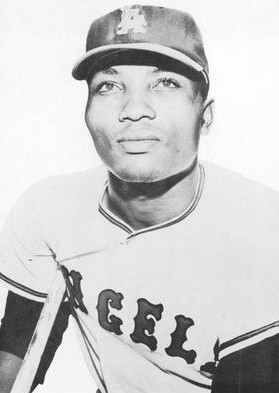Leon Wagner facts for kids
Quick facts for kids Leon Wagner |
|||
|---|---|---|---|
 |
|||
| Left fielder | |||
| Born: May 13, 1934 Chattanooga, Tennessee |
|||
| Died: January 3, 2004 (aged 69) Los Angeles, California |
|||
|
|||
| debut | |||
| June 22, 1958, for the San Francisco Giants | |||
| Last appearance | |||
| October 2, 1969, for the San Francisco Giants | |||
| MLB statistics | |||
| Batting average | .272 | ||
| Home runs | 211 | ||
| Runs batted in | 669 | ||
| Teams | |||
|
|||
| Career highlights and awards | |||
|
|||
Leon Lamar Wagner (born May 13, 1934 – died January 3, 2004) was a talented American professional baseball player. He played as a left fielder in Major League Baseball (MLB) for several teams. These included the San Francisco Giants, St. Louis Cardinals, Los Angeles Angels, Cleveland Indians, and Chicago White Sox. He was known for batting left-handed and throwing right-handed.
Born in Chattanooga, Tennessee, Leon Wagner went to Tuskegee University. Fans often called him "Daddy Wags" because of his unique batting style. He was also known as "Cheeky" due to his high cheekbones.
Contents
Leon Wagner's Baseball Journey
Leon Wagner played in MLB for 12 seasons. During his career, he had a batting average of .272. He hit 211 home runs and had 669 RBIs (Runs Batted In). He played in a total of 1352 games.
Starting with the San Francisco Giants
Wagner joined the San Francisco Giants at age 24 on June 22, 1958. This was the Giants' first year playing in San Francisco. As a rookie, he was a strong hitter. He had a .307 batting average and hit 13 home runs in 74 games.
The Giants had many great outfielders like Willie Mays and Orlando Cepeda. Because of this, Wagner was traded to the St. Louis Cardinals after the 1959 season.
Time with the St. Louis Cardinals
With the Cardinals, Wagner played in a reserve role, meaning he wasn't a regular starter. He played in 39 games and hit four home runs. One of these home runs was special. It was the first home run ever hit in Candlestick Park. This happened on April 12, 1960.
Becoming a Star with the Los Angeles Angels
In 1961, Wagner was traded to the American League (AL) expansion Angels. This was their first season, and Wagner finally became a regular player. He made the most of this chance. He hit .280, with 28 home runs and 79 RBIs in 133 games.
His best season was in 1962. He hit 37 home runs, which was the third highest in the AL. He also had 107 RBIs, 96 runs, and 164 hits. Wagner played in both All-Star Games held that year. In the second game, he hit a two-run home run. He was even voted the Most Valuable Player (MVP) of that All-Star Game. He was the first AL player to win this award.
Wagner was the first true power hitter for the Angels. He hit 91 home runs and had 276 RBIs for them. In 1963, after being chosen for his second All-Star team, he was traded to the Cleveland Indians.
Playing for the Cleveland Indians
As a left fielder for the Cleveland Indians, Wagner hit 97 home runs between 1964 and 1967. His best year with the Indians was 1964. He hit 31 home runs, had 100 RBIs, and scored 94 runs. In 1965, he hit .294 with 28 home runs. Wagner also stole 26 bases in 30 tries in 1964–65.
Finishing His Career
Wagner ended his career as a respected pinch-hitter. In 1968, he led the AL with 46 appearances in this role. He split that season between the Indians and the Chicago White Sox.
He later signed as a free agent with his first big league team, the San Francisco Giants. He played his final game on October 2, 1969. Even though he started and ended his career with the Giants, he only played 172 games for them out of his 1152 total MLB games.
Beyond Baseball: Acting Career
After his baseball career, Leon Wagner had some small acting roles. He appeared in the movie The Bingo Long Traveling All-Stars & Motor Kings in 1976. In the film, he played a member of a barnstorming baseball team from the Depression era.
Later Life and Passing
Leon Wagner passed away on January 3, 2004, in Los Angeles. The cause of death was ruled as natural causes.
 | Percy Lavon Julian |
 | Katherine Johnson |
 | George Washington Carver |
 | Annie Easley |

